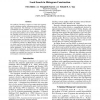Free Online Productivity Tools
i2Speak
i2Symbol
i2OCR
iTex2Img
iWeb2Print
iWeb2Shot
i2Type
iPdf2Split
iPdf2Merge
i2Bopomofo
i2Arabic
i2Style
i2Image
i2PDF
iLatex2Rtf
Sci2ools
104
click to vote
AAAI
2010
2010
Local Search in Histogram Construction
The problem of dividing a sequence of values into segments occurs in database systems, information retrieval, and knowledge management. The challenge is to select a finite number of boundaries for the segments so as to optimize an objective error function defined over those segments. Although this optimization problem can be solved in polynomial time, the algorithm which achieves the minimum error does not scale well, hence it is not practical for applications with massive data sets. There is considerable research with numerous approximation and heuristic algorithms. Still, none of those approaches has resolved the quality-efficiency tradeoff in a satisfactory manner. In (Halim, Karras, and Yap 2009), we obtain near linear time algorithms which achieve both the desired scalability and near-optimal quality, thus dominating earlier approaches. In this paper, we show how two ideas from artificial intelligence, an efficient local search and recombination of multiple solutions reminiscent ...
AAAI 2010 | Histogram Construction Algorithms | Intelligent Agents | Linear Time Algorithms | Objective Error Function |
Related Content
| Added | 29 Oct 2010 |
| Updated | 29 Oct 2010 |
| Type | Conference |
| Year | 2010 |
| Where | AAAI |
| Authors | Felix Halim, Panagiotis Karras, Roland H. C. Yap |
Comments (0)

